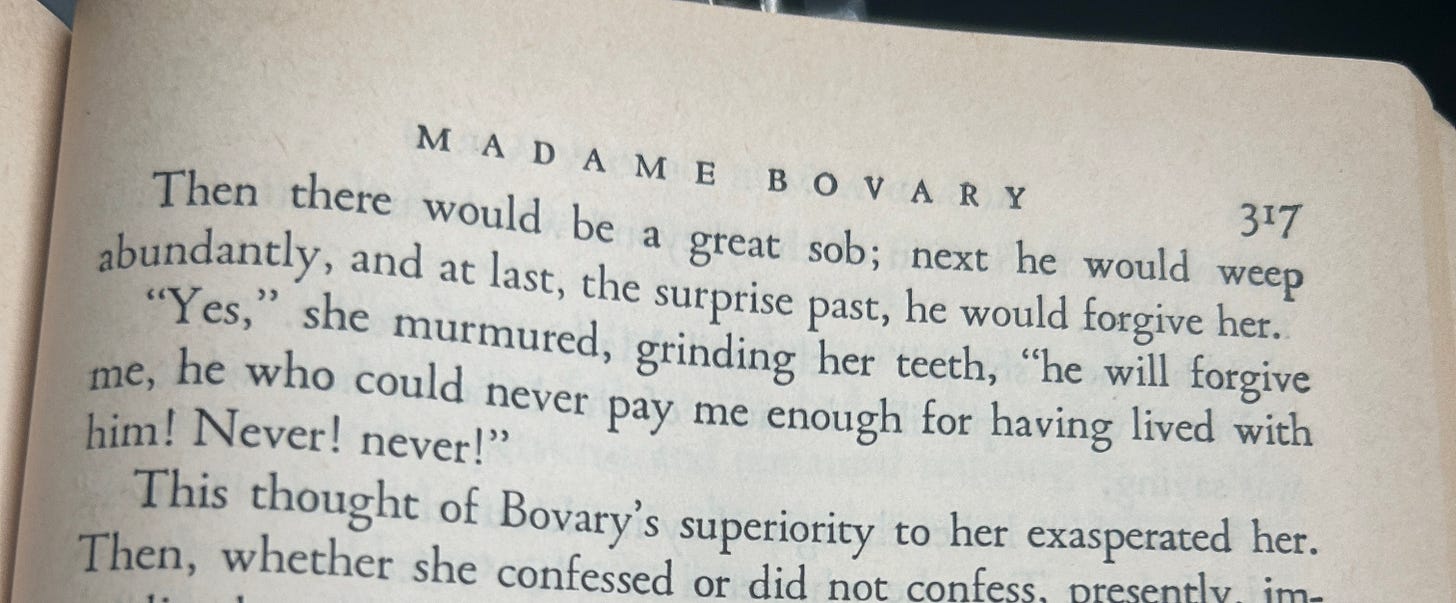
MENTIONED: Gustave Flaubert’s Madame Bovary; Dirt’s “The Desire Question”; Chris Kraus’s I Love Dick; TikTok’s Pookie and Jett; Elizabeth Hardwick’s essay “Seduction and Betrayal”;
“Robert Lowell and Elizabeth Hardwick”; Richard Linklater’s Before SunriseI finished Madame Bovary on the train yesterday from DC to New York. In my notebook, I wrote of the novel’s end: There is more truth to tragedy than a happy ending, so why do I feel… so bereft, so forlorn at its finale? My first instinct was to describe Madame Bovary as a story about the dangers of fantasy, but I think Flaubert (a French Romantic) understood fantasy as intrinsic — necessary, even — to a fulfilled life. Rather, Emma Bovary’s demise was a warning against the relentless pursuit of fantasy, culminating in its inevitable collapse when Emma’s reality becomes crushed by the weight of her fancies. And Emma, forever a fantast, chooses death (“It is but a little thing!”) over an impoverished life devoid of beauty and pleasure.
I am a person who’s historically struggled with rom-coms or, for that matter, any genre of movie where the form feels fixed, when the happy ending is written from the first glance and first meet. This makes me sound like a fundamentally unhappy person (I am not), but I am of the belief that life is, at best, a tragicomedy we have to learn to laugh at. To quote Deborah Levy quoting Orson Welles, “If we want a happy ending, it depends on where we stop the story.” But no matter where we pause in Madame Bovary, Emma’s fate seems fixed. From the masked ball at Vaubyessard, where she dances with the Viscount and gets a tease of upper-class extravagance, Emma is doomed by dreams of wealth and frivolity. Her first and truest love is for the figure of the Viscount; he is a symbol of the social standing she aspires towards unto death.
Her later suitors, Rodolphe and Léon, are mere substitutes for that great fantasy. With Rodolphe, she recalls the Viscount’s scent, how his beard “exhaled … an odor of vanilla and citron” similar to Rodolphe’s pomade. And with Léon, a younger lover who was loyally submissive to her fancies, she indulged in luxuries beyond both their means. These men were keen on eventually ridding themselves of Emma (as a married woman, she can be no more than a mistress), but their betrayals were not what inevitably did her in. What kills Emma is her desire for more, a slow-burning poison that manifests in a frustrated melancholy towards the limits of her middle-class life.
My favorite response from Dirt’s The Desire Question (“Is it better to desire or be desired?”) is Geoff Rickly’s: “I think desire is a kind of beauty that you get to hold inside you. It’s the state of being filled with desire that generates heat. Being desired is just having a reflective surface.” (My answer, as you can guess, is “to desire.”) Rickly’s response recalls a passage from Chris Kraus’s 1997 novel I Love Dick, written from the perspective of Chris’s husband Sylvère: “Desire radiates even if it is not directed towards you … It has an energy and beauty.”
I Love Dick is an epistolary novel told through a series of one-sided letters by Chris Kraus, a 39-year-old experimental filmmaker, to Dick, an English cultural critic and colleague of Chris’s husband. The correspondence was born out of a dinner with Dick when the couple was in Los Angeles. Chris and Dick lightly flirt, Dick invites her and Sylvère to his place for post-dinner drinks, and the couple falls asleep on Dick’s couch. When they wake up, Dick was gone. The two head home, feeling a bit like they’ve been jilted. It is Sylvère who initiates the letters. Instead of feeling cucked by his wife’s collegial crush, he becomes excited, almost homoerotically, by his proximity to her desire. Chris’s infatuation sends a fresh bolt of electricity to their enervated marriage, briefly reviving the corpse of their romance. Kraus also draws explicit parallels between Chris and Sylvère and Emma and Charles. As Emma’s hopeful contemporary, Chris is creatively energized by her romantic obsession. She thrives, unlike Emma, who is depleted and destroyed by desire.
I Love Dick presents desire as a revelation, a potent force that delivers Chris from her mid-life crisis. Succumbing to it yields an all-encompassing aliveness (“I love you alive girl”), a stative ecstasy that borders on despair. To desire is to turn your soul inside out, baring it towards a void, an ocean of surfaces. I think those who intellectualize desire, who treat it as a springboard for their own work (Romantic artist-writer types) and/or greater self-understanding, are most aware of desire’s “reflective surface[s].” The engine of desire is fantasy. “If we go down into ourselves we find that we possess exactly what we desire,” writes Simone Weil in Gravity and Grace. (Coincidentally, in I Love Dick, Chris’s upcoming film — and its two protagonists — is titled after Gravity and Grace.) Weil believed that what we desire is ultimately unreal; the desired object/person is a fantasy-figment of our imagination. But she contends it is nearly impossible to separate our desire from the desired object. Doing so induces suffering, delivering “an unspeakable wrench in the soul.”
*
In her essay “Seduction and Betrayal,” Elizabeth Hardwick seeks to distinguish the betrayed heroine from the betrayed woman in a novel.
The heroine, according to Hardwick, was “never under the illusion that love or sex confers rights upon human beings. She may, of course, begin with the hope, and romance would scarcely be possible otherwise; however, the truth hits her sharply, like a vision or a revelation when the time comes. Affections as if they were objects are not things and persons never can become possession, matters of ownership.”
The truth hits Emma when Rodolphe abandons their plan to run away together, stunning her into a months-long sickness. Perhaps this is why, to counteract the potential of Léon’s later betrayal, Emma embarks on an elaborate spending spree. She fills up on material possessions. If she is incapable of fully possessing her lover, she is determined, at the very least, to possess beautiful things. She blindly sinks into debt to subsist this fantasy.
Hardwick concludes her 1972 essay on a somber note. She argues that “the old plot is dead … You cannot seduce anyone when innocence is not a value. Technology annihilates consequences.” I am not sure what she means by that last sentence (in a society defined by surveillance, technology is arguably wielded to demand consequences), though I agree with Hardwick’s overall sentiment: Seduction is an outdated dance that no one knows the steps to anymore.
Madame Bovary is set in mid-nineteenth century France, and its characters are constrained and compelled by ethical codes and religious norms that are unfamiliar to most readers today. Yet, the idealistic and romantic spirit of the novel’s era — a spirit that Flaubert debased and ironized — feels unnervingly familiar amidst the resurgence of the tradwife and the stay-at-home girlfriend, social “trends” undergirded by inflation and rising wealth inequality. Is it a coincidence that romance novels, too, are on the rise? Innocence may no longer be a value, but the marriage plot persists as the gold standard fantasy that plays out on social media, in YA and romance literature, and pop culture.
*
When reading Hardwick on women and betrayal — specifically, “Affections as if they were objects are not things and persons never can become possession, matters of ownership” — I can’t help thinking about her disloyal husband, the poet Robert Lowell. (For more on that affair, read Laurie Stone on Hardwick and Lowell’s on-and-off-again marriage: “Robert Lowell died of heart failure in a taxi on the way from Kennedy Airport to the apartment where Elizabeth Hardwick lived, on west 67th Street … He died holding a large parcel wrapped in brown paper. When Hardwick opened it, she found a portrait of [his second wife Caroline] Blackwood he’d brought back to New York to have appraised.” Brutal.)
But with social media, affections can be displayed as an object. The Image of the Lover, more so than their Being, is something we can possess, exhibit, and flaunt. For this very reason, I am suspicious of the Pucketts, or anyone who’s committed to recording, displaying, and profiting off the minutiae of their relationship on the internet. The Pucketts are colloquially known online as Pookie and Jett. They are white, wealthy, and Southern, and always jet-setting off to some destination in Europe. Jett loves to dote on Pookie; his descriptions of her outfits have effectively become a meme (“She’s looking absolutely fire tonight”), catapulting the Pucketts to platinum-certified #couplegoals status on TikTok. Think of them as the modern antithesis of Charles and Emma Bovary — rich, seemingly fulfilled, and tastelessly American. Perhaps the marriage plot is passé now, too.
Have we succumbed to Madame Bovary Syndrome, or Bovarysme — a term used by literary scholars to describe a proclivity towards excessive daydreaming and fantasizing? (Flaubert reportedly drew inspiration for Emma’s moods from his own experiences and feelings: “Getting lost in trances and suffering from “fits,” he often called himself a hysteric, specifically in letters to a friend and fellow author, George Sand. Flaubert explicitly states, “… obeying the advice of Dr. Hardy, who calls me ‘an hysterical woman’ — a phrase that I find profound,” (Goldstein 134). He self-diagnosed himself with hysteria in a time where it was a medical condition most commonly associated with women.”1 ) The difference is: We daydream online. We’re eager voyeurs, obsessed with the perfect surface of a marriage. Pookie and Jett are like characters from a storybook world come to life. We indulge in their selective reality to give credence to a fantasy that we suspect is too smooth, too optimal to be true.
“Where did you get him?” one comment asks jokingly, as if a husband is a pair of pants to be found at the store.
I do not believe, as Hardwick does, that “misfortune in the emotional life is always ahead of us.” The Romantic in me always returns to a scene from Richard Linklater’s Before Sunrise, a film that has a special place in my heart, where Celine and Jesse are sitting on a bench at the end of their night. Celine says: “I really believe that if there’s any kind of god, he wouldn’t be in any one of us — not you, not me — but just this space in between. If there’s some magic in this world, it must be in the attempt of understanding someone else, sharing something, even if it’s almost impossible to succeed. But who cares: the answer must be in the attempt.” That is worth fantasizing after. Another person who finds the answer in the attempt.
Audrey C. Giesler, “Madame Bovary Syndrome: The Female Protagonist’s Plight” https://encompass.eku.edu/cgi/viewcontent.cgi?article=1815&context=honors_theses#:~:text=Ultimately%2C%20the%20Madame%20Bovary%20Syndrome,contentment%2C%20and%20unhealthy%20coping%20mechanisms.





